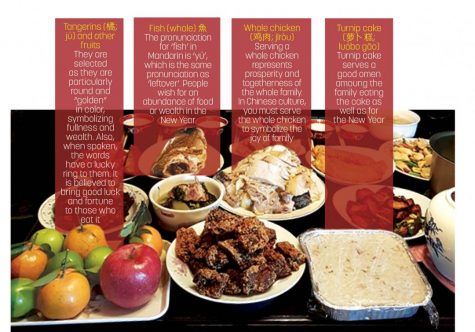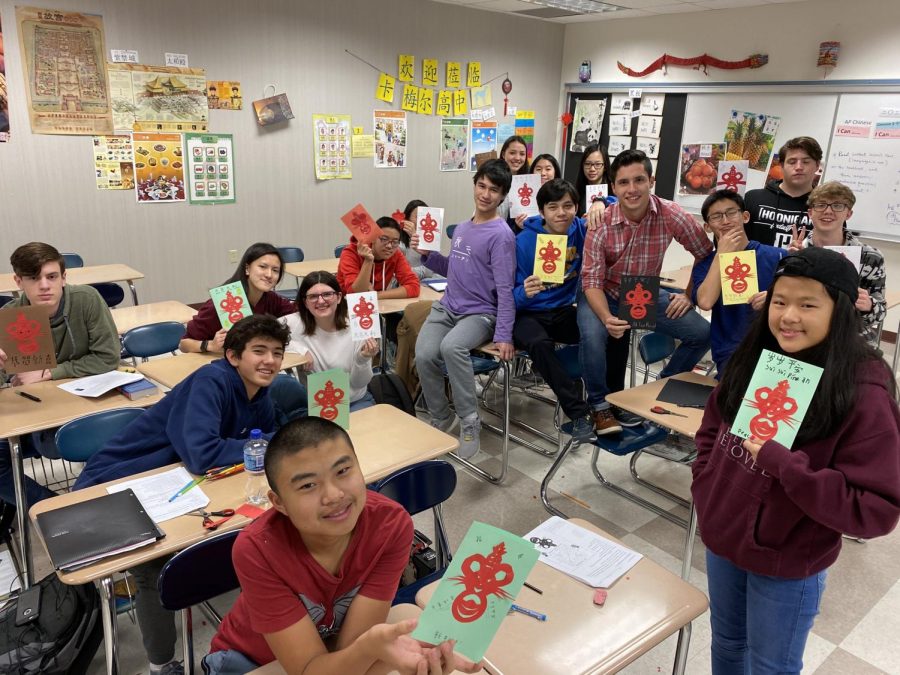Today, Chinese New Year is celebrated all around the world, but because of the COVID-19 pandemic, many families have to change the way they celebrate the holiday. For example, while junior Aleen Zhao said she normally gathers with friends and families, this year she has had to communicate with others via the internet.
“Chinese New Year is a time where families celebrate the lunar new year. (For my family,) we normally gather with other friends and families and have a big feast (to celebrate the holiday). Because of COVID-19, large gatherings are not possible anymore and changes may be made to the Chinese New Year Gala which will definitely take away the excitement for the holiday,” Zhao said. “Instead, we will have to find a way to communicate with others online, similar to what we did last year. Last year, my family wished each other a happy new year through texting and video calling.”
Like Zhao, junior Colin Zou said he also plans to communicate virtually.
“Usually, I have a big meal with my family and friends, and we would watch the CCTV Chinese New Year gala together. We also eat traditional foods such as fish and dumplings,” Zou said. “Due to COVID-19, I will not be able to see friends in person, so we will have to use virtual communication such as a phone call to connect with them. Last year, we had to cancel a visit to a family friend and relative’s house due to the pandemic.”
While Zhao and Zou will celebrate Chinese New Year by communicating with others online, sophomore Amilyn Ho said she will celebrate the holiday by spending time with her family at home.
“My family’s way of getting the food has changed. We have a cardboard box with a UV light attached to it. We use it to kill whatever germs that could be on the groceries,” Ho said. “Not a lot of things would change for me since my Chinese New Year celebration is (normally) at home. We will still have a family dinner. My mom usually steams two fishes, makes a dish with green beans and then for dessert, we have 年糕 (rice cake). We also sometimes have a hotpot and eat sprouts, pea stalks, sliced meats, shrimp, clams, fish balls, tofu, etc.”
Like Ho, Zhao said even with COVID-19 a few of her plans and traditions will not be affected or changed.
“Some traditions that we will (still be doing this year) would be wearing red and decorating the house in red as red is a lucky color,” she said. “The Chinese New Year Gala is also a show my family (likes to) watch to celebrate. Another tradition would be that children bow down to the elder in return for a red envelope which contains money.”
While COVID-19 affects Chinese New Year celebrations at home, it will also affect Chinese New Year celebrations at school. Chinese teacher Tungfen Lee said her classes normally celebrate the holiday by cooking and bringing traditional Chinese New Year food, creating red envelopes and watching the Chinese gala.
“Last year, for the Chinese 3 and AP Chinese classes, we celebrated (the holiday) by having a feast (which) students brought in a certain Chinese New Years dish (to share with the class),” Lee said. “(Students) also had a project where they gave a presentation (on the holiday and the dish they created). (They also) made red packets, and at the end of the week, I filled the packets with chocolate coins. They also got to play Chinese traditional games such as the Chinese Yo-yo.”
However, because of the COVID-19 pandemic, Lee said she has to change her plans to celebrate Chinese New Year at school.
“(COVID-19) definitely affects Chinese New Year,” Lee said. “For example, for our school, our Chinese class, we are not able to celebrate the way we used to. We used to cook and share our food, but (this year) we are not able to do that. When I try to have students write with calligraphy brushes, I have to sanitize each brush. (The pandemic) causes so many inconveniences.”
Due to all the changes and the cancellation of the feast, some students said they are disappointed as the feast is their favorite Chinese New Year activity.
“My favorite (class activity) is getting to cook together and eat the traditional foods,” Zou said. “It’s a fun way to connect with everyone and have a good time.”
Like Zou, Ho said she is also disappointed about the feast being cancelled, as her favorite activity is also the feast and gathering.
“The most memorable activity was cooking traditional Chinese food. It was exciting to follow a recipe to cook a dish, bring it to school for everyone to try and to try everyone else’s dishes,” Ho said. “During the feast, we also watched the Chinese military march that occurred a few days prior. It was a fun experience.”
Despite all the changes, Zou, Ho and Zhao said they are all excited for the holiday and that they are still about to eat delicious food.
“My favorite part of Chinese New Year is gathering around the dinner table with my family and eating a tasty meal,” Ho said. “The hotpots will always be a favorite of mine.”
Zhao said, “Even with the changes (due to COVID-19), I (still) can’t wait for Chinese New Year, (so I can) hang out with friends, eat delicious food and watch the Chinese Gala.”
Click here to view photos taken two years ago to see how people celebrated before the COVID-19 pandemic.
































![What happened to theater etiquette? [opinion]](https://hilite.org/wp-content/uploads/2025/04/Entertainment-Perspective-Cover-1200x471.jpg)














































![Review: “The Immortal Soul Salvage Yard:” A criminally underrated poetry collection [MUSE]](https://hilite.org/wp-content/uploads/2025/03/71cju6TvqmL._AC_UF10001000_QL80_.jpg)
![Review: "Dog Man" is Unapologetically Chaotic [MUSE]](https://hilite.org/wp-content/uploads/2025/03/dogman-1200x700.jpg)
![Review: "Ne Zha 2": The WeChat family reunion I didn’t know I needed [MUSE]](https://hilite.org/wp-content/uploads/2025/03/unnamed-4.png)
![Review in Print: Maripaz Villar brings a delightfully unique style to the world of WEBTOON [MUSE]](https://hilite.org/wp-content/uploads/2023/12/maripazcover-1200x960.jpg)
![Review: “The Sword of Kaigen” is a masterpiece [MUSE]](https://hilite.org/wp-content/uploads/2023/11/Screenshot-2023-11-26-201051.png)
![Review: Gateron Oil Kings, great linear switches, okay price [MUSE]](https://hilite.org/wp-content/uploads/2023/11/Screenshot-2023-11-26-200553.png)
![Review: “A Haunting in Venice” is a significant improvement from other Agatha Christie adaptations [MUSE]](https://hilite.org/wp-content/uploads/2023/11/e7ee2938a6d422669771bce6d8088521.jpg)
![Review: A Thanksgiving story from elementary school, still just as interesting [MUSE]](https://hilite.org/wp-content/uploads/2023/11/Screenshot-2023-11-26-195514-987x1200.png)
![Review: "When I Fly Towards You", cute, uplifting youth drama [MUSE]](https://hilite.org/wp-content/uploads/2023/09/When-I-Fly-Towards-You-Chinese-drama.png)
![Postcards from Muse: Hawaii Travel Diary [MUSE]](https://hilite.org/wp-content/uploads/2023/09/My-project-1-1200x1200.jpg)
![Review: "Ladybug & Cat Noir: The Movie," departure from original show [MUSE]](https://hilite.org/wp-content/uploads/2023/09/Ladybug__Cat_Noir_-_The_Movie_poster.jpg)
![Review in Print: "Hidden Love" is the cute, uplifting drama everyone needs [MUSE]](https://hilite.org/wp-content/uploads/2023/09/hiddenlovecover-e1693597208225-1030x1200.png)
![Review in Print: "Heartstopper" is the heartwarming queer romance we all need [MUSE]](https://hilite.org/wp-content/uploads/2023/08/museheartstoppercover-1200x654.png)



